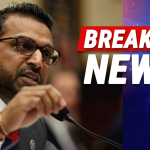
In architecture, they say the smallest crack in a foundation can bring down the tallest tower—a lesson some politicians learn too late. For eight years, New Jersey voters have been told a story about military service, honor, and leadership.
But like so many political narratives these days, the polished surface hid something far less inspiring underneath.
The U.S. Naval Academy stands as one of America’s most prestigious institutions, where future military leaders learn that integrity isn’t just a word—it’s a way of life. “Midshipmen are persons of integrity: They stand for that which is right,” the Academy’s honor concept declares.
These aren’t just pretty words etched in stone; they’re supposed to be carved into character. When someone builds their entire political career on that foundation, voters have a right to expect it’s solid.
New Jersey’s gubernatorial race seemed straightforward enough. Democrat Rep. Mikie Sherrill, running neck-and-neck with Republican Jack Ciattarelli in recent polling, had centered her campaign on her Naval Academy credentials and military service. It was her calling card, her proof of leadership … until this week.
It turns out Sherrill was barred from walking with her graduating class at the Naval Academy’s 1994 commencement ceremony. The reason? She failed to report classmates involved in what became the largest cheating scandal in the institution’s history; a scandal that implicated over 400 midshipmen who had obtained and shared electrical engineering exam answers.
Twenty-four of her classmates were expelled. The superintendent resigned. Congress held hearings. And Sherrill? She kept quiet about her punishment for three decades. Let that sink in for a moment. Three decades of silence.
A Pattern of Concealment
The revelation emerged when journalists obtained a copy of the 1994 commencement program with Sherrill’s name conspicuously absent. When confronted, she finally admitted the truth, but with a particular spin that’s become all too familiar.
From ‘New Jersey Globe’ and Sherrill’s statement:
“I didn’t turn in some of my classmates, so I didn’t walk, but graduated and was commissioned as an officer in the U.S. Navy, serving for nearly ten years with the highest level of distinction and honor.
The scandal revolved around electrical engineering exam answers that some midshipmen obtained and shared with their classmates in December 1992.”
Notice the deflection—immediately pivoting from the scandal to her subsequent service. It’s a classic political maneuver: acknowledge just enough to seem honest while redirecting attention elsewhere. But for eight years, while campaigning on her Academy credentials, she never mentioned this “small detail” to voters.
Republican challenger Jack Ciattarelli didn’t mince words:
For eight years, Mikie Sherrill has built her entire political brand around her time at the Naval Academy and in the Navy, all the while concealing her involvement in the scandal and her punishment.
In a Fox News appearance with Sean Hannity, he demanded she “come clean” about what really happened.
The Democrat Playbook
Sherrill’s response was predictably defensive, accusing Ciattarelli of using the “MAGA playbook of smearing military service.” Yes, that’s familiar: When caught hiding uncomfortable truths, claim victimhood and invoke Trump. It’s becoming as reliable as sunrise.
Meanwhile, her Democratic allies scrambled to change the subject, demanding investigations into how her military records were obtained, as if the real scandal is the revelation rather than the concealment.
This fits a troubling pattern we’re seeing across the country: Democrats run on carefully curated biographies, presenting themselves as paragons of virtue and service. But when the facade cracks, when the real story emerges, they attack the messenger rather than address the message.
The frequency of these revelations is accelerating, from fabricated military records to hidden business dealings to academic credentials that don’t quite check out.
You know, these are the same politicians who demand “transparency” and “accountability” from others. They’re quick to question their opponents’ integrity over parking tickets from decades ago, yet hide significant ethical lapses in their own past. Sherrill wants to lead New Jersey, to make decisions affecting millions of lives, but couldn’t muster the courage to report cheating when it mattered.
The polls show a dead heat—43 percent for both candidates. New Jersey voters now face a choice that goes beyond party lines. Ask yourself this: It’s about character, about whether someone who failed a basic test of integrity at 21 and then hid it for 30 years can be trusted with executive power.
When the foundation cracks, everything built on top becomes unstable. Voters deserve leaders whose integrity doesn’t require constant renovation.
Key Takeaways
- Democrat Mikie Sherrill hid her Naval Academy cheating scandal punishment for 30 years
- She built her entire political career on military credentials while concealing this ethical failure
- When confronted, she deflected with accusations of “MAGA attacks” rather than taking responsibility


